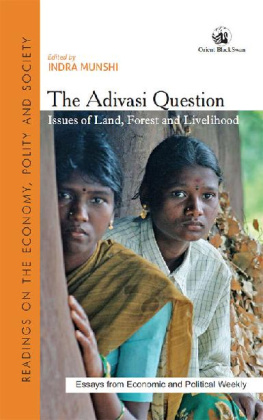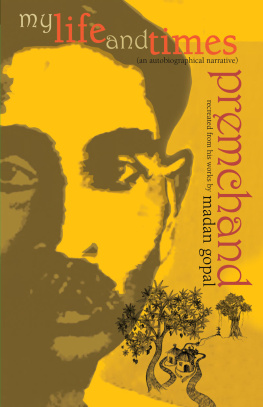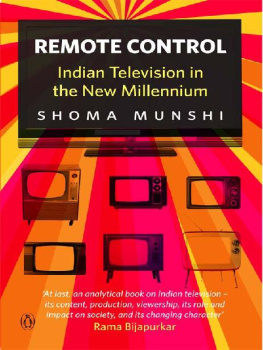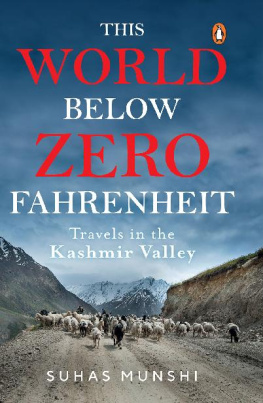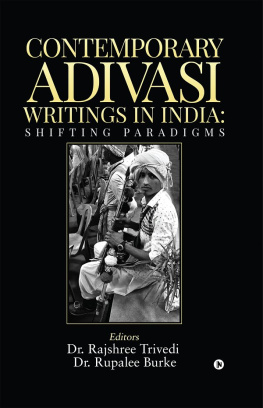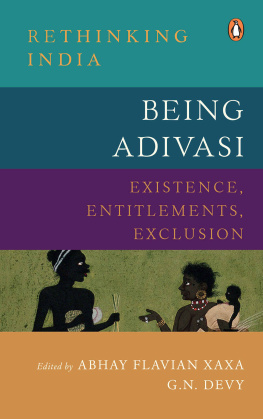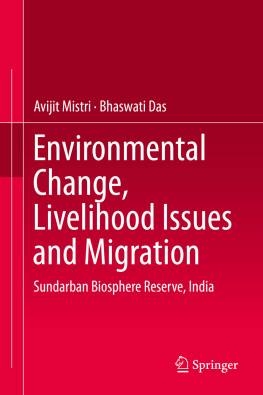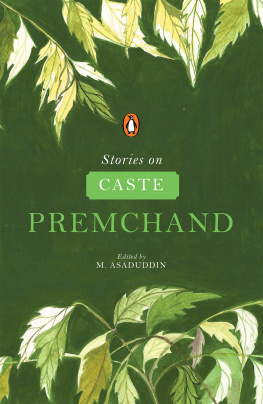The Adivasi Question
For our entire range of books please use search strings "Orient BlackSwan", "Universities Press India" and "Permanent Black" in store.
Readings on the Economy, Polity and Society
T his series is being published as part of a University Grants Commission project to promote teaching and research in the social sciences in India. The project (201012) has been jointly executed by the Tata Institute of Social Sciences, Mumbai, and the Economic and Political Weekly. The series is meant to introduce university students and research scholars to important research that has been published in EPW in specific areas. The journal has, over the decades, published a large number of research papers in all the social sciences. The readers draw on this archive of EPW s published articles. The titlesin economics, politics, sociology and the environmentreflect EPW s strengths as well as the interests of the academic community. Each set of readings is compiled by a senior academic who has also written an introductory essay for the volume. TISS and EPW are grateful to the authors of the articles included here for permission to reprint them.
Published
Economic Reforms and Growth in India, ed. Pulapre Balakrishnan
Environment, Technology and Development: Critical and Subversive Essays ,
ed. Rohan DSouza
Village Society, ed. Surinder S. Jodhka
Women and Work, ed. Padmdmini Swaminathan
Decentralisation and Local Governments: The Indian Experience,
ed. T. R. Raghunandan
The Adivasi Question
Issues of Land, Forest and Livelihood
Edited by
INDRA MUNSHI
Orient BlackSwan Private Limited
Registered Office
3-6-752 Himayathnagar,Hyderabad 500 029 (Telangana), INDIA
e-mail:
Other Offices
Bangalore Bhopal Bhubaneshwar Chandigarh Chennai
Ernakulam Guwahati Hyderabad Jaipur Kolkata
Lucknow Mumbai New Delhi Patna
www.orientblackswan.com
Orient Blackswan Private Limited and Economic and Political Weekly 2012
First Published 2012
Reprinted 2013
eISBN 978 81 250 5848 9
e-edition first published in 2015
Published by,
Orient Blackswan Private Limited
1/24 Asaf Ali Road
New Delhi 110 002
e-mail:
All rights reserved. No part of this publication may be reproduced,distributed, or transmitted in any form or by any means, including photocopying, recording, or other electronic or mechanical methods, without the prior written permission of the publisher, expect in the case of brief quotations embodied in critical reviews and certain other noncommercial uses permitted by copyright law. For permission requests write to the publisher.
Contents
Section I
Regulations and Resistance, Adivasi Communities
in the Colonial Context
A Historical Analysis
Ramachandra Guha
Garo Protest in Late Nineteenth and
Early Twentieth Century Assam
Sanjeeva Kumar
Ashoak Upadhyay
Section II
Loss of Land, Loss of Nerve
Panel Data Analysis
E. Selvarajan
Case of Santhal Parganas
Nitya Rao
B. B. Mohanty
Turning the Clock Back
Brian Lobo
K. Balagopal
Section III
Forest Degradation and Forest Communities
9 Forest Degradation, Changing Workforce
Structure and Population Redistribution
The Case of Birhors in Jharkhand
Sohel Firdos
Its Impact on Ongek
Pankaj Sekhsaria
DN
Section IV
Conservation vs Community Rights
Space against Place in Narmada Valley
Judy Whitehead
Conservation, Control and Conflicts
Sagari R. Ramdas
Kushiara Village, Mirzapur
Neela Mukherjee
Section V
Displacement and Rehabilitation: Role of the State
Mathew Areeparampil
Case of Kuno Wildlife Sanctuary, Madhya Pradesh
Asmita Kabra
Coping with Displacement
Renu Modi
Section VI
Forest Rights Act: A Step Forward
18 Issues Related to Implementation of
the Forest Rights Act in Andhra Pradesh
M. Gopinath Reddy, K. Anil Kumar, P. Trinadha Rao,
and Oliver Springate-Baginski
Indra Munshi
20 Implementation of the Forest Rights Act in
the Western Ghats Region of Kerala
Jyothis Sathyapalan
Mahesh Rangarajan
The Science Agenda
Madhav Gadgil
Section VII
Resource Management: By Whom and for Whom
Markets and Privatisation among Indigenous Peoples
Dev Nathan and Govind Kelkar
A Rare Success Story in Joint Forest Management
Emmanuel DSilva and B. Nagnath
Conservation and Tribal Rights
Amita Baviskar
I NTRODUCTION
I NDRA M UNSHI
T he term tribe was used by the colonial government in India to categorise a large number of groups who did not fit the categories of caste or Hindu. The term subsumed communities very different from one another in terms of demographic size, linguistic and cultural traits, ecological conditions, material conditions of living, but essentially primitive, backward and uncivilised in character. After Independence, the term Scheduled Tribe (ST) came to be used to denote tribes which were scheduled as such under the Constitution of India, distinguished from other communities by relative isolation, cultural distinctiveness and low level of production and subsistence, not necessarily original inhabitants. Indian words like adivasi (first settlers), vanvasi (inhabitants of forests), vanyajati (forest communities), pahari (hill-dwellers), adimjati (original communities/ primitive people), janjati (folk people), anusuchit jati (ST), are also used. Most of the contributors to this volume seem to have used the terms adivasi, tribal and indigenous communities interchangeably.
Scholars have shown that there are references to forest-dwellers in ancient and medieval literatures, to their volatile nature, and the mode of production of some of them as consisting of hunting and gathering are also noted. Many established states and acquired political power or were absorbed into regional political systems, which left them with considerable autonomy in the management of their affairs and control of resources. It is also well established that there were linkages between the tribe and peasants, graziers and craftsmen who also used the produce of the forest. Tribals were in touch with the Hindu peasants and craftsmen through the market, who were responsible for the introduction of many agricultural techniques and crafts in tribal areas. In India, therefore, isolation of tribes was relative and never absolute as in other countries (Singh 2005: 10). It is important that this aspect of isolation is not overstated in defining tribes.
The nature of interaction between the tribal and peasant societies seems to have been far more complex than that delineated by the so-called processes of absorption and sanskritisation as suggested by N. K. Bose and M. N. Srinivas. Although many of them came within the social and economic orbit of Hindu society, which resulted in them emulating the lifestyles and religious practices of the upper castes, there is ample evidence to suggest that there was indeed a great deal of give-and-take and mutual interaction between the societies. This process, the noted historian D. D. Kosambi, traces to ancient times when tribal deities and tribal rituals and cults were modified and incorporated within brahminical Hinduism. The matriarchal elements were retained by identifying the mother goddess with the wife of some male god. The worship of the newly absorbed primitive deities, Kosambi observes, was part of the mechanism of acculturation, a clear give- and- take (Kosambi 1976: 16970).

